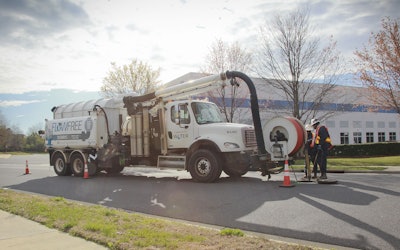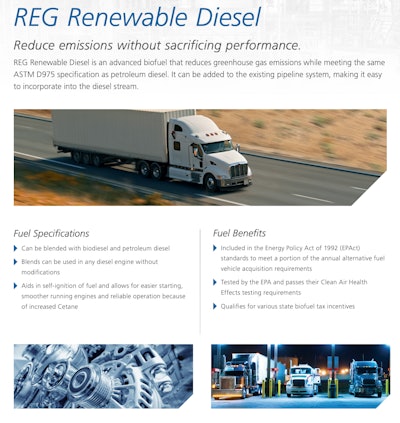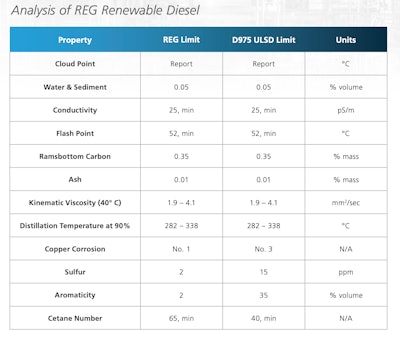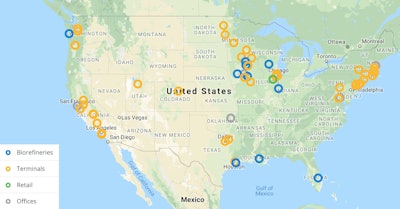
Kathy Gibson, fleet manager at Charlotte Water in North Carolina, has been busy trying various alternative fuels, including most recently renewable diesel.
She started a pilot program in May with Iowa-based Renewable Energy Group which has been supplying 34 of her diesel trucks with REG Renewable Diesel.
“Everything’s fine. No problems,” she said. “There’s been no performance drop-off. No complaints.”
Gibson remains impressed with the fuel’s lower emissions. According to REG, Charlotte Water reduced greenhouse gas emissions by approximately 75 tons in the first three months of the pilot. After a year that would add up to 300 tons, or the equivalent of over 732,000 miles driven.
“As a public utility, we believe we have an obligation to protect the environment,” Gibson said. “Fueling diesel vehicles with 100 percent renewable diesel instead of petroleum diesel is a way to promote sustainability in the communities we serve, and the results have been very encouraging.”
According to REG, compared with ultra-low sulfur diesel, renewable diesel reduces particulate matter by nearly 40 percent, carbon monoxide by 25 percent, nitrogen oxides by 15 percent and total hydrocarbons by over 10 percent.
“We’re thrilled with the environmental and performance results Charlotte Water has seen so far and are confident Charlotte Water and their customers will continue to benefit from renewable diesel,” said Gary Haer, vice president of sales and marketing at REG. “With transportation being the largest source of carbon dioxide emissions in the U.S., we are proud of the role we are playing in reducing air pollution in the Charlotte area, nationwide and around the world.”
Renewable diesel is a drop-in alternative to petroleum-based diesel made from renewable plant and animal resources. Renewable diesel is not biodiesel. While the two fuels may share similar feedstocks, renewable diesel undergoes an additional step of production, namely hydrotreating, gasification or pyrolysis, which further purifies the fuel. Unlike biodiesel, renewable diesel is not prone to phase separation and gelling in colder temperatures.
REG Renewable Diesel has an impressive cetane rating of 65 compared to conventional diesel which typically falls between 42 and 45. A higher cetane value leads to improved combustion and fewer emissions. Diesel fuel in California is required to have a minimum cetane number of 53 which, along with its lower emissions, has helped to make renewable diesel more popular there than other states.
“The trend line for growth of renewable diesel is positive driven primarily by policy in California,” said Ezra Finkin, director of policy at Diesel Technology Forum. “Through California’s Low Carbon Fuel Standard that requires reduction in the carbon content of transportation fuel sold in the state, renewable diesel fuel is proven to be a cost-effective pathway. Thanks to the fuel’s low carbon intensity, its ability to be used as a replacement to petroleum and the fact that the fuel can be used in existing diesel engines and requires no additional refueling infrastructure, demand for renewable diesel fuel is growing and supply is meeting growing demand.”
It’s this increased supply of renewable diesel that has caught Gibson’s attention. While pleased with its performance, Charlotte Water is paying roughly double the price for renewable diesel over conventional.
“It’s not cheap, but it’s worth it,” Gibson said while again referring to the fuel’s lower emissions.
In 2015 California opted to use renewable diesel in its fleet in place of biodiesel. The fuel is subsidized which can sometimes make it cheaper than conventional diesel. For instance, one station we called on Wednesday was selling it for $3.89 per gallon while the average price for conventional diesel was listed at $4.00 the week prior according to the U.S. Energy Information Administration.
As the market grows, Gibson said she’ll remain on the lookout for the best deal for her fleet. That means finding enough renewable diesel to fuel upwards of three hundred trucks out of a fleet of 1,500.
In addition to renewable diesel, Gibson also started a propane pilot in February. She’s been working with Blossman Gas and using their pickup conversion kits. She’s also been trying out an electric car and though interested in electrified trucks, she said she’ll wait and see how those larger EVs play out in the market.














